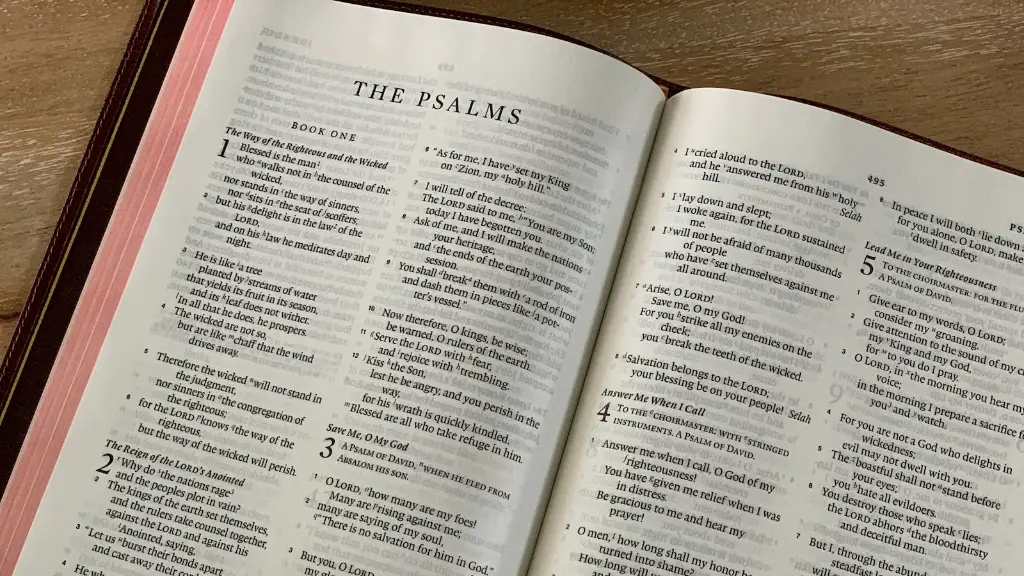The Gospel of Thomas is an ancient text written around the same time as the gospels of the New Testament, but why is it not included in the Bible? This has been a source of debate amongst scholars and theologians alike, as the Gospel of Thomas is thought to contain many of the same teachings as the New Testament books. In this article, we will explore the possible reasons for its exclusion and the implications this may have for how we understand early Christian history.
There are several theories as to why the Gospel of Thomas was not included in the Bible. One theory is that the Gospel of Thomas contains teachings that are contrary to the teachings of the New Testament books. This includes teachings on Jesus’ mission, his identity and his relationship with God. This could be one of the main reasons the Gospel of Thomas was not accepted into the Bible, as it did not fit in with traditional Christian beliefs.
Another reason the Gospel of Thomas might have been excluded from the Bible is its source. Unlike the other gospels, which are mainly attributed to the apostles, the Gospel of Thomas was likely written by unknown authors. This lack of authorship would have made it difficult to authenticate its content as well as its origin. The Gospel of Thomas also contains teachings that are not found in the Bible and could have been seen as unorthodox by the early church.
A further possible reason why the Gospel of Thomas was not included in the Bible is the fact that it was written in a different language than the other gospels. This language was likely Coptic, which was commonly used in Egypt, where the text originated from. The difficulty of translating the text from Coptic to English could also have played a role in why the Gospel of Thomas was not included in the Bible.
The exclusion of the Gospel of Thomas from the Bible has implications for how we understand early Christian history. Scholars believe that the Gospel of Thomas may have influenced all four canonical gospels, meaning that its teachings were likely taken into account in their formation. The fact that these teachings were not included in the Bible means that the original message has been lost, making it difficult to fully understand early Christianity.
The fact that the Gospel of Thomas was excluded from the Bible has also sparked debate around censorship. As this text challenges traditional Christian beliefs, it is possible that the decision to exclude it from the Bible was done in an attempt to control and suppress certain teachings. This could have implications for our understanding of religious censorship and the power of religious institutions to regulate what is and is not acceptable in religious texts.
In conclusion, the exclusion of the Gospel of Thomas from the Bible is a source of debate and has implications for our understanding of religious censorship, early Christian history and the formation of the gospels. It is clear that there are several theories as to why it was not included in the Bible, such as its source, language and content, but it is difficult to determine the exact reason for its exclusion. Nevertheless, the Gospel of Thomas is an important document that can provide insight into early Christianity and its teachings.
Debate Around Censorship
The censorship of the Gospel of Thomas has sparked much debate not only amongst scholars, but within the general public as well. This is because the fact that the text was excluded from the Bible is seen by some as an attempt to control and suppress certain teachings. This has led to further discussion about the power of religious institutions to regulate and decide which texts are acceptable.
This discussion has become even more relevant in modern times, with the rise of the “cancel culture” whereby certain views and expressions are immediately condemned, and those who express them are vilified or censored in some way. This can raise questions about how much should be regulated or censored within religious texts, and how much should be left for interpretation and discussion.
This debate is related to the broader discussion around freedom of speech and expression, and the power of institutions to regulate what is acceptable and what is not. This is an important discussion to have, as it can provide insight into the limits of religious censorship and the importance of open, honest dialogue when it comes to religious texts.
The exclusion of the Gospel of Thomas is evidence of the power of religious institutions to control what is acceptable within religious texts. It raises questions about the role of censorship, and the implications this can have for our understanding of religious texts and early Christianity.
Implications for Understanding Early Christianity
The exclusion of the Gospel of Thomas from the Bible has implications for our understanding of early Christianity. This is because the text contains teachings that are not found in the other gospels, and scholars believe it may have influenced all four of the canonical gospels. This means that its teachings were likely taken into account in their formation, and the fact that these teachings were not included in the Bible means that the original message has been lost.
This raises questions about how much of Christianity’s teachings were influenced by the Gospel of Thomas, and how much of its original message has been lost. It also raises questions about how much we can truly understand early Christianity without access to the original teachings contained in the Gospel of Thomas.
This has implications for how we view religious texts, and the importance of preserving the original teachings contained within these texts. It also speaks to the power of religious institutions to regulate and censor what is acceptable in religious text, and the implications this can have for our understanding of early Christianity.
Underlying Themes
One of the most interesting aspects of the exclusion of the Gospel of Thomas from the Bible is the underlying themes this decision raises. Specifically, the debate around censorship, freedom of speech and the power of religious institutions to decide what should and should not be included in religious texts. This has been a source of debate for centuries, and it is an important discussion to have in modern times.
This debate is related to the broader discussion about the importance of open, honest dialogue when it comes to understanding religious texts and interpreting their true meaning. It is clear that access to the original teachings contained within these texts is essential if we are to gain a fuller understanding of early Christianity and its teachings.
The exclusion of the Gospel of Thomas from the Bible is a reminder of the power of religious institutions to regulate what is and is not acceptable in religious texts. It raises questions about censorship, freedom of speech and the implications this can have for our understanding of early Christianity.
Modern Comparisons
The exclusion of the Gospel of Thomas from the Bible can be compared to the rise of “cancel culture” in modern times. This is a phenomenon whereby certain views and expressions are immediately condemned, and those who express them are vilified or censored in some way. This can raise similar questions about how much should be regulated or censored within religious texts, and how much should be left for interpretation and discussion.
This comparison raises relevant questions about the power of religious institutions to control what is acceptable within religious texts. It also speaks to the importance of open, honest dialogue when it comes to religious texts, and the implications this can have for our understanding of early Christianity.
The exclusion of the Gospel of Thomas from the Bible is a reminder of the power of religious institutions to control what is acceptable within religious texts. It is a stark reminder of the importance of preserving the original teachings contained within these texts, and the implications this can have for our understanding of early Christianity.
Modern Implications
The exclusion of the Gospel of Thomas from the Bible has implications for how we view religious texts, and the importance of preserving the original teachings contained within them in modern times. This is especially relevant given the current rise of “cancel culture”, where certain views and expressions are immediately condemned and those who express them are vilified or censored in some way.
This raises relevant questions about how much should be regulated or censored within religious texts, and how much should be left for interpretation and discussion. It also speaks to the power of religious institutions to control what is and is not acceptable within these texts, and the implications this can have for our understanding of these texts and early Christianity.
The exclusion of the Gospel of Thomas from the Bible is a reminder of the power of religious institutions to decide which texts are acceptable and which are not. It is a reminder of the importance of open, honest dialogue when it comes to religious texts and interpreting their true meaning, and the implications this can have for our understanding of early Christianity.





